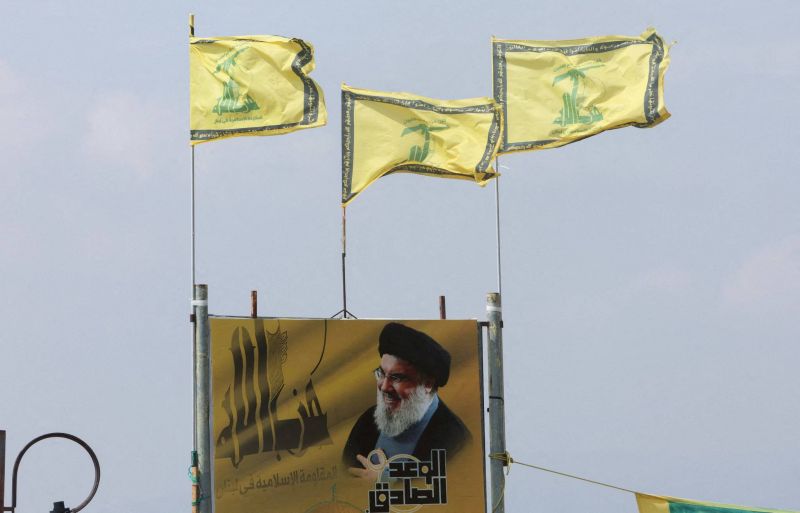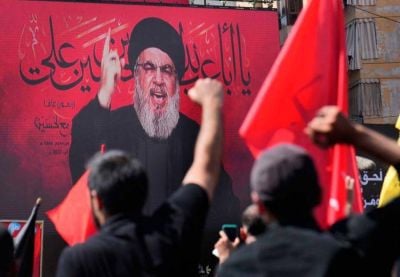
A billboard featuring Hassan Nasrallah and the party flags in Kfarshouba at the border in southern Lebanon. (Credit: Aziz Taher/Reuters)
Will it be the most important speech of his life? The one that will officially make him no longer Hezbollah’s Secretary General, but the commander-in-chief of the "Axis of Resistance" throughout the Middle East?
Twenty-eight days after Hamas’ deadly operation in Israel, Hassan Nasrallah will finally break his silence.
Will it be to announce a regional escalation? Or will it be because he simply has no choice but to make an appearance? It’s likely a combination of both.
As we have been saying since Oct. 7, with its surprise attack, Hamas has changed the rules of the game, shattering all certainties.
Until we have a comprehensive understanding of this operation — its motives, and goals — it will be quite challenging to predict the conduct of both Hezbollah and Iran.
Yet, we can already put forward two hypotheses.
First, it seems unlikely for Nasrallah to declare today the start of a full-scale war against Israel.
Second, almost every utterance in his speech will sound like a declaration of war.
This might seem contradictory. But it is precisely on this contradiction that Hezbollah’s leader is likely to play.
War without war? Or perhaps a war, but with certain constraints?
Today, every word will carry significant weight.
These are the three key points we will pay special attention to.
Will Nasrallah officially adhere to the party’s red lines?
This is the central question, assuming that Hezbollah’s leader will not announce the start of an all-out war against Israel.
Since Oct. 7, Hezbollah’s red lines, and by extension, those of Iran, have been known (even if such red lines are mentioned less explicitly). They threaten to intervene if the survival of Hamas is at stake, if the population of Gaza is displaced, or if the status quo in the coastal enclave is disrupted.
It is highly likely that Nasrallah will issue strong threats in his speech, presenting ultimatums to both Israel and the United States.
But how specific will he be? If Nasrallah decides to adhere to the red lines, this will mark a real turning point for one simple reason: he will be staking his credibility, making it much more challenging for him to retreat if things don’t go as planned.
If his threat is as explicit as the one he issued during the negotiations on the demarcation of the maritime border between Lebanon and Israel, it could imply two things.
Either he is convinced that Israel will be compelled to scale down its objectives — the destruction of Hamas in Gaza — and he feels confident enough to issue threats without risking a significant backlash.
Or Hezbollah and its Iranian sponsor believe that the current circumstances favor an escalation to a higher level, with the aim of altering the balance of power in the region.
What will Nasrallah say about the war in South Lebanon?
If Nasrallah is not likely to declare the start of an all-out war today, it’s also because the party believes it’s already engaged in a war, not just in a theoretical sense but in very practical terms since Oct. 8.
The day following the Hamas attack, Hezbollah launched a barrage of rockets at the occupied territories of Shebaa. Since then, hardly a day has passed without exchanges of fire between Hezbollah and the Israeli army, leading to a gradual escalation on both sides. This escalation reached its peak on Thursday evening, just before the scheduled speech.
Hezbollah claimed responsibility for a simultaneous attack on "19 Zionist military positions and sites using guided missiles, shells," and various other weapons.
The party also announced the deployment of drones "loaded with a substantial amount of explosives" to target the occupied Shebaa Farms, marking a significant development since the conflict’s onset.
Meanwhile, the al-Qassam Brigades, Hamas’ military wing, reported firing 12 rockets from southern Lebanon into the Israeli town of Kiryat Shmona and its surrounding areas in northern Israel.
If, since Oct. 7, Hezbollah has been formally declaring the death of each of its soldiers, it is to emphasize that it is actively involved in the conflict and not merely an observer, thereby compelling Israel to divert some of its resources and attention to its northern border.
However, Hezbollah has suffered heavy losses (almost 55 fighters killed) in a relatively short span of time.
At the same time, some voices within the party support base question why Hezbollah isn’t taking a more active role in the conflict.
Nasrallah must strike a delicate balance between these factors in order to clarify to his audience, particularly to the families of fallen fighters, why they sacrificed their lives for a war that has yet to begin.
The party leader will need to elucidate the military and political importance of their "sacrifice" and likely provide a detailed outline of future steps to reassure his party’s members about its capability to confront Israel over the long term.
To what extent will the party be involved in Hamas’ Al-Aqsa Flood operation?
Several media outlets, including L’Orient-Le Jour, have revealed that the Hamas operation was prepared in Beirut in coordination with Iran’s Pasdaran and Hezbollah.
Iran has officially denied any role in the attack, and both the US and Israel claim to have no evidence to date of Iranian involvement.
There are many indications that no one wants to talk about Iran’s responsibility, for fear of what this would imply for future events.
And to what extent will Nasrallah be involved in this operation?
While it seems unlikely that he will admit any direct involvement on the part of his party, he could leave some ambiguity by hailing an action carried out by the "Axis of Resistance."
In his highly anticipated speech, the Hezbollah leader will address his audience. He will try to galvanize his supporters, while simultaneously trying to contain their enthusiasm.
The leader’s message is intended for several key audiences. First and foremost, he seeks to reassure and embrace the Lebanese people. At the same time, he will direct his words toward Israel, aiming to dissuade it from going too far in Gaza. He will address the US to warn it about the potential costs of regional escalation.
It’s likely that he will also address the broader Arab community to express his disapproval of ongoing normalization processes with Israel.
However, he will tread cautiously, avoiding excessive rhetoric that could risk alienating them.
Nasrallah will be speaking on Friday on behalf of the entire "Axis of Resistance," not just Hezbollah. In this way, his speech will be a decisive moment in the trajectory of the Hamas-Israel war, and the region’s involvement in it.
Will Nasrallah wag his index finger to lift the veil on his camp’s true intentions for the days ahead? We will know in a few hours.
This article was originally published in French in L'Orient-Le Jour. Translation by Sahar Ghoussoub.
